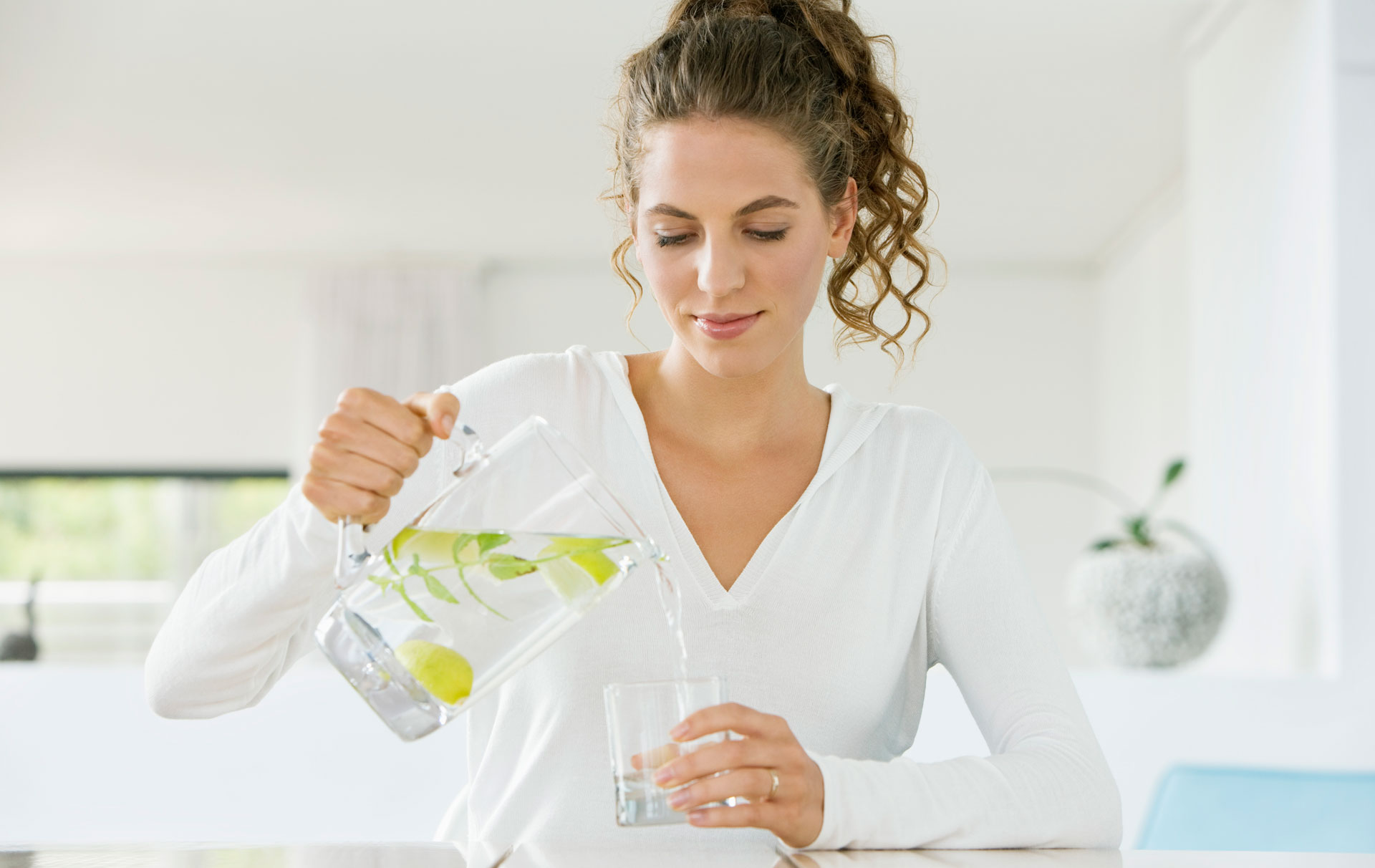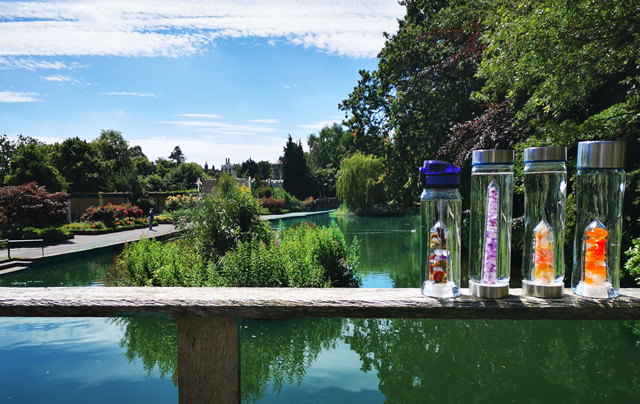Benefits of drinking water: How it affects your skin, weight and more
We're always being told about the benefits of drinking water yet struggle to get our daily dose, so how much water should we really be drinking per day?

Water – we all need it to live. But are you reaping the benefits of drinking water by including enough in your daily routine?
The general rule is that we need eight glasses of water daily. And while there are hydration benefits from drinking tea and eating liquid-based food such as soup, nothing beats a pure glass of water when it comes to everything from preventing constipation to helping us feel more awake.
The benefits of water range from getting better skin to weight loss - and there are many other reasons why water is good for you below, along with tips on how to avoid dehydration.
How many litres of water should you drink a day?
The European Food Safety Authority says women should aim for 2 litres a day and men should have 2.5 litres of water a day. However, it doesn't all need to come from drinking water. Helen Bond, a registered dietitian and spokesperson for the British Dietetic Association, explains that "we get about 20% of fluid from the foods we eat, so it’s estimated that women need around 1.6 litres of fluid (about 6 x 250ml glasses) and men around 2 litres a day (about 8 x 250ml glasses)." This is only a guide, however, as "how much fluid we need varies according to our age, gender, levels of activity and the climate," she says.
Dr Carrie Ruxton, dietitian for the Tea Advisory Panel adds: "Being pregnant adds an extra 300ml daily to water needs, while breastfeeding adds an extra 700ml per day."
Carries agrees that you can hydrate via a range of sources: "As well as drinking water it can come from foods such as soup and yogurt, and hydrating drinks such as regular black tea, herbal teas, dairy milk, plant milks and zero calorie drinks," she says.
One drink that won't hydrate you and isn't a substitute for drinking water is alcohol. This is because it is a mild diuretic and will dehydrate you.
Parenting advice, hot topics, best buys and family finance tips delivered straight to your inbox.
How do we know if we're drinking enough water?
'I get my clients to check the colour of their urine to see if they are hydrated or not,' says Nicola Shubrook, a registered nutritionist and founder of Urban Wellness. 'You want to look for a very pale or light yellow – not completely clear as you may be drinking too much fluid – and be aware that certain supplements such as B vitamins, or foods like beetroot, may alter your urine colour.'
What are the benefits of drinking water?
- 1. Improves general mental and physical performance - Our bodies need water regularly – and little and often is best. 'Even mild dehydration, which can be measured as a 1-2% loss on body weight, would have a negative impact on mental and physical performance,' says Carrie.
- 2. Improves kidney health and helps prevent UTIs - Not drinking enough water can lead to sluggish kidneys and urinary tract infections. 'Mild dehydration can can increase your risk of developing kidney stones and UTIs,' says Helen.
- 3. Reduces fatigue - "With blood being 90% water, it helps to deliver oxygen around the body and may help reduce fatigue," says Nicola. If you feel tired, try drinking a large glass of water to see if it perks you up.
- 4. Helps improve gut function - Drinking water is an essential element of a healthy gut. "Because water removes waste products from the body, mild dehydration increases your risk of developing constipation," says Helen. As a result, you may feel bloated. Conversely, drinking water can reduce bloating.
"There are lots of links with healthy digestion and drinking enough water," says Nicola. "Water helps to ensure that the body is detoxifying and removing waste naturally and regularly. However, it's best to sip water throughout the day, rather than glugging large glasses in one go – this is less likely to have you running to the toilet every five minutes!" - 5. Reduces risk of headaches - When we have a headache it's easy to reach for some painkillers when all we need is a large glass of water. "Mild hydration can increase the risk of headaches," says Nicola.
- 6. Aids aching joints - If you find that your joints are aching, one of the reasons could be that you are dehydrated. Helen explains that this is because: "water lubricates and cushions joints." So staying hydrated is key to feeling fit and healthy.
- 7. Improves brain function and mood - 'Water is needed by the body to produce hormones and neurotransmitters (brain chemicals), so mild dehydration can affect brain cognition and mood,' says Nicola. 'Even mild dehydration can can leave you feeling irritable,' adds Helen.
- 8. Boosts your emotional health - Although regarded as nonsense by some, others are convinced that adding crystals to drinking water can boost our emotional and physical health. 'There's a tradition of using crystals in and around water, which goes back millennia, and there's evidence to suggest that the frequency emitted by crystals (you have quartz in your watch and your mobile phone because it emits an electronic frequency) restructures the water molecules, improving oxygen levels and pH,' explains Jude Polack, director of bewater reusable water bottles, which contain crystals thought to "unlock happiness, vitality and wellbeing".
'It's so easy to overlook, but drinking well is just as important for good health as eating and living well,' says Helen. 'Water is essential for life, health and wellbeing – your body has water in every cell, tissue, and organ. It helps transport nutrients and oxygen to cells, regulates body temperature, and keeps the skin moisturised and healthy – as well as carrying out lots of other important jobs,' she says.
For example, bewater's Glow water bottle 'combines rose quartz, amethyst and green aventurine – crystals that are associated with relief from stress, promotion of sleep, healthy circulation and great skin,' says Jude, while 'carnelian improves motivation, and amethyst relieves stress and brings clarity,' she says. Even if you don't believe, your gorgeous water bottle will be the envy of all.

Does crystal-infused water have emotional benefits? (Credit: Bewater)
What are the benefits of drinking water for skin?
It's touted as an integral part of our beauty routine, but how does water improve the largest organ in the body? 'Our skin is a thirsty organ – it contains about 72% water,' explains Helen. 'Many beauty therapists and dermatologists regard good hydration as important to help keep the skin’s elasticity, softness, tone and appearance. So, as well as eating well, to keep your skin looking youthful, make sure you're taking on board enough fluid. Opting for water means that you’re not adding sugar or calories to your daily diet, while maintaining good levels of hydration,' she says.
'A healthy fluid intake also balances oil levels in skin to avoid greasiness. And it ensures that the skin is adequately defended against sun and wind damage. You’ll still need your sun cream, though,' adds Carrie. In fact, drinking enough water can even help skin conditions like cracked heels.
What are the benefits of drinking water for weight loss?
While water doesn't contain any magic fat-burning properties, it can be a useful aid in managing hunger and improving bodily functions that help us maintain a healthy weight. "People often confuse thirst for hunger and end up snacking on unnecessary calories instead of drinking," says Carrie. "So, if you’re trying to lose weight, drink a glass of water if you’re feeling peckish," she suggests.
You can also sip water while you eat. 'Upping your fluid intake during mealtimes may encourage you to eat more slowly – this allows satiety cues to catch up,' she says.
Although gulping down water is not a substitute for food or skipping meals, drinking fluid can take the edge off hunger. It can also help with sugar cravings. "When we are dehydrated it makes it harder for the body to metabolise stored energy (glycogen) and so we crave sugar in response to the need for energy," Nicola explains.

Always start the day with a glass of water. (Credit: Getty)
Tips for avoiding dehydration
Helen also has some top tips. Here, she gives an easy-to-follow breakdown on how to incorporate more water into your day:
- Start the day as you mean to go on. Water levels in the body are low first thing so have a refreshing drink and water-rich fruit (such as melon or oranges) with your morning meal.
- Out of sight, out of mind. Always make an effort to refill your cup, glass or drinks bottle. You're likely to drink more if you see a drink in front of you.
- Prepare. Always keep a jug on your desk, a bottle in your bag or a glass by your side. Or fill a 1.5 litre bottle at the start of the day and make it your mission to empty the bottle.
- Don’t rely on thirst. You don’t feel as thirsty when the weather is cold, so thirst may not be the most accurate indicator of the body’s fluid needs when the temperature drops. As long as you’re sipping regularly throughout the day, urinating frequently – and your urine is a pale, yellow colour like straw – then you’re drinking enough.
- Drink on the move. Finding a healthy drink when you're on the go isn't always easy so carry a bottle with you. It doesn’t mean sticking to just water – make drinks tasty with low-sugar squashes or hot herbal teas.
- Don’t forget, food counts. Fruits and vegetables contain a high percentage of water. For example, an apple is 86% water, bananas are 75% water, carrots are 88% water and cucumber is 97% water. Take advantage of colourful, seasonal produce that's water-rich and packed with immune-supporting vitamins and minerals.
- Stay hydrated while you exercise. This is because you lose more water through sweat. Follow the golden rule for hydration and drink plenty of fluids before, during and after exercise.
- Take stock of your environment. Centrally heated homes and offices dry out the air and speed up the evaporation of sweat on the skin. This can increase our fluid needs, so drink more and at regular intervals.
If you want to take advantage of the benefits of drinking water but you're someone who finds plain water a bit dull, Nicola suggests adding "slices of lemon or lime, or herbs such as mint" to make a glass of water more appealing. Or, "If you're used to fizzy drinks try to reduce your intake by swapping with sparkling water," she suggests.
Finally, if you still keep forgetting to fill up, Nicola suggest you get a little extra help. 'There are hydration apps available to remind you to drink enough water each day,' she advises. We suggest WaterMinder or Aloe Bud.

Debra Waters is an experienced online editor and parenting writer. She also has a strong background on health, wellbeing, beauty, and food. She currently writes for Goodto and Woman&Home, and print publications Woman, Woman’s Own, and Woman’s Weekly. Debra has written for What to Expect, Everyday Health, and Time Out. In addition, she has had articles published in The Telegraph and The Big Issue.